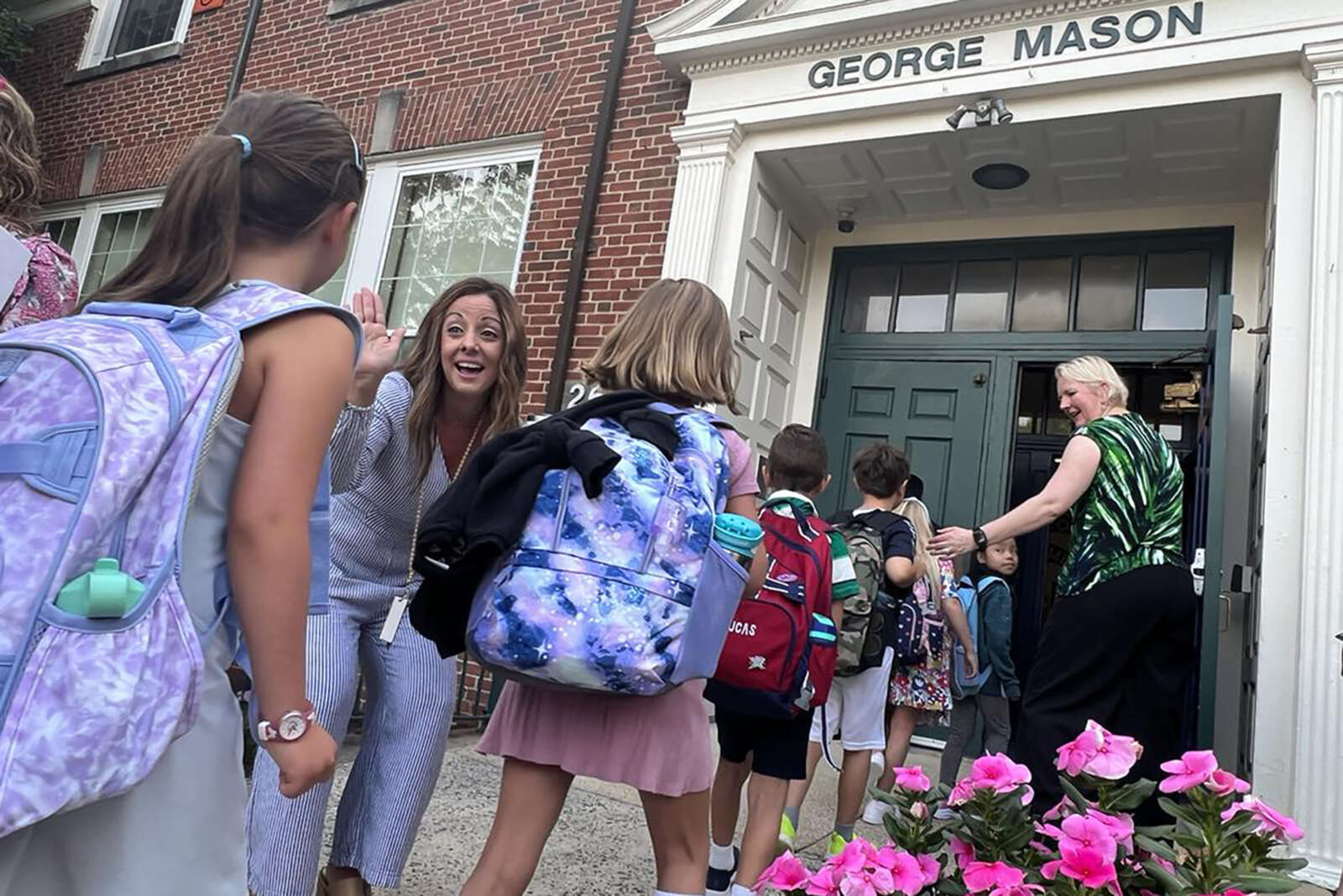
Alexandria City Public Schools (ACPS) is the biggest winner of a 2.5 cent tax rate increase being considered by City Council, but it still falls short of the budget voted on by the School Board.
The School Board voted earlier this year to request $384.4 million from the City Council — $21 million more than previous budgets and double the budget proposed by Superintendent Melanie Kay-Wyatt. Mayor Justin Wilson previously said that fulfilling that budget request would require an unprecedented 6-cent tax increase.
Of the roughly $11 million the city would gain from a 2.5 cent increase, the current Add Delete being considered by the City Council would send $8.7 million to ACPS — $4.7 million for capital contributions and $4 million for the operating budget. The additional funding to ACPS comprises 2 cents of the 2.5 cent increase.
The next most expensive projects being considered are $3 million for affordable housing projects and $3 million in contingency funding for mental health staffing.
According to a budget request submitted by City Council member Alyia Gaskins:
Fully funding the School Board Approved FY 2025 – FY 2034 Capital Improvement Program (CIP) funding request would require the addition of $65 million for George Mason Elementary Hard Costs, Cora Kelly Elementary Soft Costs, and Cora Kelly Elementary Hard Costs. Budget memo #53 outlines that it would be possible to use a mixture of additional borrowing and pay-as-you-go cash capital to alleviate some of the longer-term cost burdens of borrowing. This $4.7 million is then intended to be used to increase cash capital to the Schools capital program and mitigate the amount of borrowing required for the additional $65.0 million.
Mayor Justin Wilson said there’s still uncertainty about how much ACPS will receive from the state budget.
The relationship between the City Council and the School Board has historically been tense, especially when it comes to budget discussions, and there was some reticence from the Council to hand over the majority of the tax rate increase to ACPS.
“Not to say that they don’t need it, but there’s need on the city side as well,” said City Council member Canek Aguirre. “There’s a lot of need on the city side we’re not addressing unless we kick it down the road to next year.”
Gaskins said she recognized that the funding to ACPS was a big ask, but that it’s one that’s desperately needed.
“I in no way deny that these are not significant increases,” Gaskins said, “but I think they’re trying two very important sides of what ACPS is dealing with on the capital and operating side.”
Budget adoption is scheduled for Wednesday, May 1.

Alexandria Civil Rights leader Ira Robinson, the first Black man elected to the City Council after Reconstruction, died last Friday at his home in Temecula, California.
Robinson was 85 years old.
Robinson was elected to the City Council in 1970. Before the election, 19-year-old Robin Gibson was murdered at a 7-11, which sparked three days of rioting. Robinson was credited with settling the riots and, at one point, saving the life of an Alexandria policeman surrounded by an angry crowd.
Robinson served on the City Council for three years and was instrumental in working toward full compliance with desegregation laws.
During the many challenges in America at a time, Ira Robinson represented hope for a new America,” said McArthur Myers, who was the youth coordinator for Robinson’s campaign.
In a release, the City of Alexandria detailed some of Robinson’s history with the city:
During his three-year term on the Council, Robinson was instrumental in bringing about major changes in education, housing, and law enforcement, including a 1971 secondary school integration plan that brought the Alexandria public schools into full compliance with federal desegregation law. Nearly three decades after that plan consolidated three previous high schools into T.C. Williams secondary school, the turmoil of that period – and the resulting football championship that reunited the community – remained such a potent story that it became the basis of the Disney movie, Remember the Titans.
Also marking that era in Alexandra politics were the titanic, but civil, debates between Robinson, a Democrat, and Wiley F. Mitchell, a Republican, whose priorities for the city, though often at odds, led to steady increases in minority hiring, the distribution of moderate and low-income housing city-wide, the development of the Metro area transit system, and eventual redevelopment of the Potomac Railroad Yard, Cameron Station, and the neighborhoods along the Route 1 corridor and Mount Vernon Avenue.
Before his election to council, Robinson focused much of his activism on changing the face of policing in the city and on relations between police officers and Alexandria’s African-American youth. In 1968, he served on the Alexandria Crime Commission and, the following year, as adviser to a Michigan State University team, hired by the city manager to produce a “Study of Police Community Relations” in Alexandria. Robinson also served on the Alexandria Commission on Criminal Justice and the Metropolitan Council of Government’s Task Force on Drug Abuse. He also chaired the city’s Urban League voter registration drive, served on the boards of the local branch of the NAACP and the Boys Club, and was a member of the Alexandria Economic Opportunities Commission and the Mayor’s ad hoc Committee on Health Care. An avid sports fan, he advocated for young African American athletes who needed legal advice.
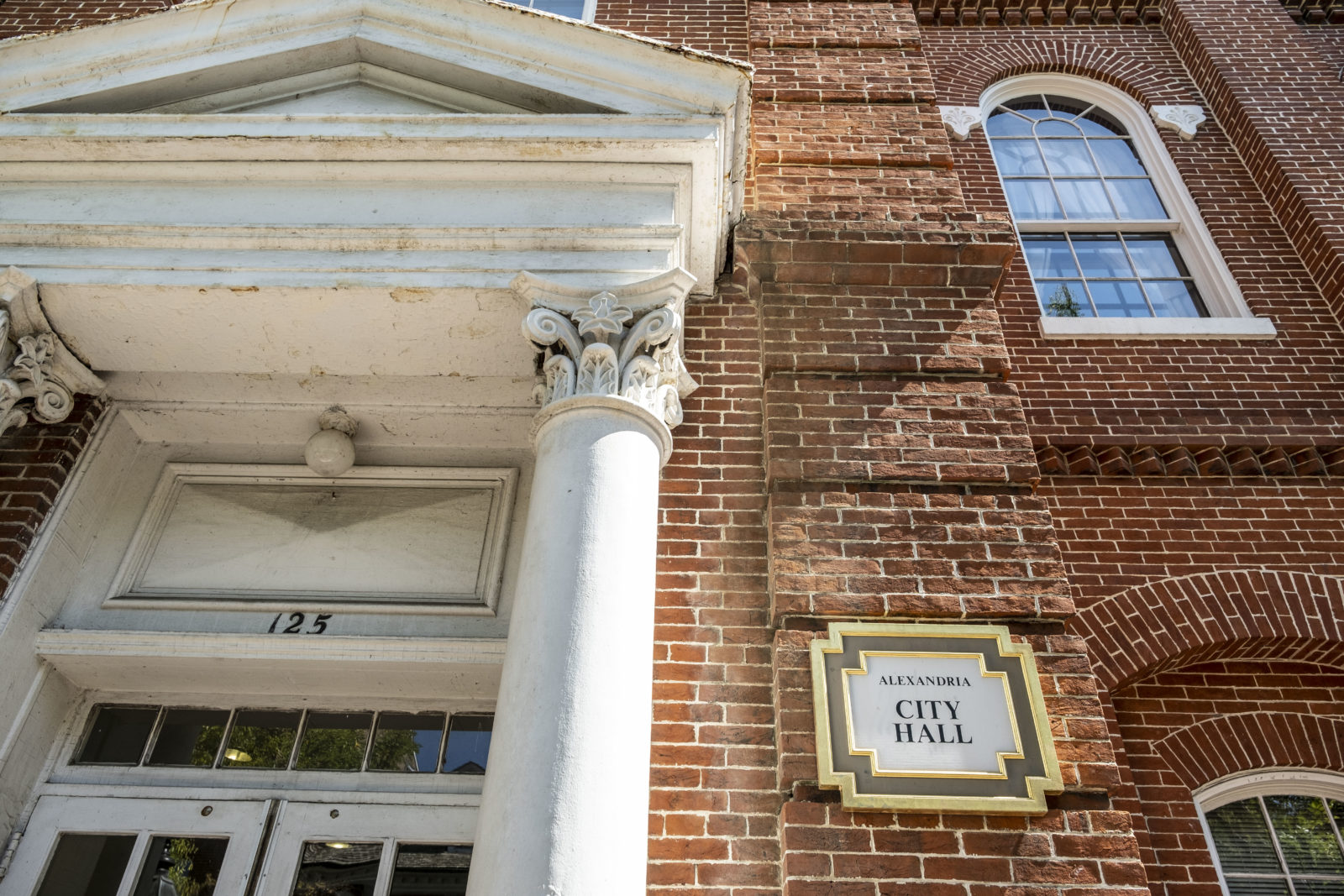
Alexandria’s City Council will approve its fiscal year 2025 budget in a little more than a week, and important actions will be taken between now and then.
On Wednesday (April 24), Council will hold a public hearing on the city’s tax rate. Last month, a 4-cent tax ceiling was approved for consideration, allowing city staff and local legislators wiggle room in analyzing funding options in exchange for raising taxes. Each penny added to the tax rate is about $4.7 million, and a 4-cent tax increase would bring in $18.8 million.
This year’s residential taxes are expected to rise due to underperforming commercial real estate assessments, as well as a proposal to raise salaries for teachers in Alexandria City Public Schools.
Alexandria’s commercial property tax rate fell 4% this year, or $736.9 million. The value of the city’s office properties fell 12.38%, from $3.58 billion in 2023 to $3.14 billion in 2024, according to a city report. It’s the second year in a row that office properties dipped in value, dropping 10% last year.
Council will also conduct a budget work session on Wednesday with their proposed budget additions and deletions.
City Council will approve the fiscal year 2025 budget on May 1.
The deadline has now passed for members of Council to propose amendments to the Manager’s proposed budget.
Amendments must have the support of 3 members to be considered during the remainder of the process.
This is the preliminary list of amendments:https://t.co/82LQDifJYN
— Justin Wilson (@justindotnet) April 5, 2024

Over time, Alexandria’s Alex311 service hotline has been getting better at responding to requests from locals.
The City of Alexandria usually gets a little over 30,000 requests through the Alex311 hotline. Those range from reports of missed trash collection to questions about trees and potholes.
A new presentation, scheduled to go to the City Council on Wednesday, April 24, showed that the Alex311 has gradually been getting more responsive and passed its goal last year.
Last year, Alex311 completed 84% of service requests within the estimated service resolution timeframe. That varies by the request, from 3 to 240 business days based on the complexity of the request.
That’s an increase over 76% in FY2022 and 72% in FY2021.
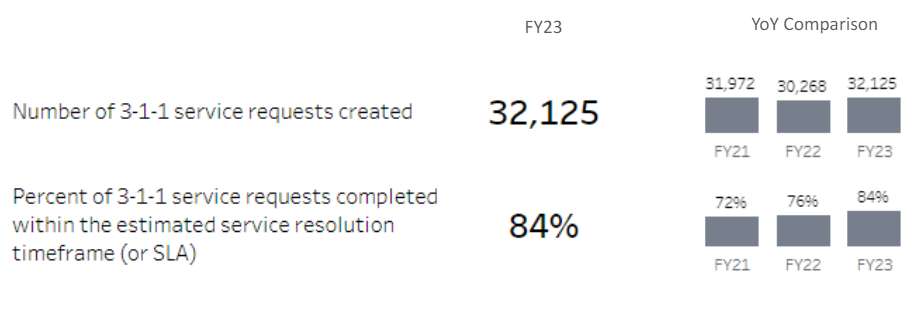
The report also said changes have been made behind the scenes to communicate more of the Alex311 requests to City Council. There’s a City Council liaison assigned as a point of contact to ask “non-routine questions,” who will then work with departments to get a response within seven business days.
The City Council also now receives a file of all requests submitted to all members of the City Council every week. The reports include details on the status of the request and responses from department staff.
Photo via Alex311/Facebook
New parks, 400-foot-tall commercial and residential buildings and more.
The Hoffman family and its associates have a comprehensive idea for the future of the 79-acre site next door to the Eisenhower Avenue Metro station in Alexandria’s Carlyle neighborhood.
The collection of vacant properties are located in and around the Hoffman Town Center, home to the National Science Foundation, a popular movie theater, a Wegmans grocery store, as well as a number of large apartment buildings.
Hoffman, its affiliates and Arlington-based Paradigm Companies will present their coordinated development district (CDD) conceptualization design plan to the Planning Commission at City Hall (301 King Street) on June 4.
Hoffman and Paradigm are proposing the eventual development of multiple apartment buildings up to 400-feet tall, commercial buildings up to 300-feet tall, as well as space for a new school, a new city park, walking trails, a dog park, and tennis and basketball courts.
The 20-page document is a framework for future development, where property boundaries for individual blocks are outlined, and so are building heights, streetscape designs and expected uses, such as open space areas.
As far as a timeline, the developers said in their application that phased development “can occur at any order and is subject to change,” and that uses for the underdeveloped blocks could include vehicle parking, material storage, city agency training, a farmer’s market, festival space, a beer garden and “other similar uses approved by the city.”
Paradigm owns the 24-story Parc Meridian at Eisenhower Station apartment building (750 Port Street), the dual-tower Carlyle Place apartment building (2251 Eisenhower Avenue) and well as the unfinished 26-story Meridian 2250 apartment building project (2250 Dock Lane). Hoffman owns seven blocks within the property.
The site has contaminated soil. According to Hoffman and Paradigm:
To the best of our knowledge contaminated soil may be on site… Based on environmental investigations, Block 2 contains arsenic and has high total chromium levels. Block 3 contains arsenic, petroleum hydrocarbons and chlorinated solvents. Additional investigations will be completed with each DSUP (development special use permit) when a block moves forward with redevelopment.
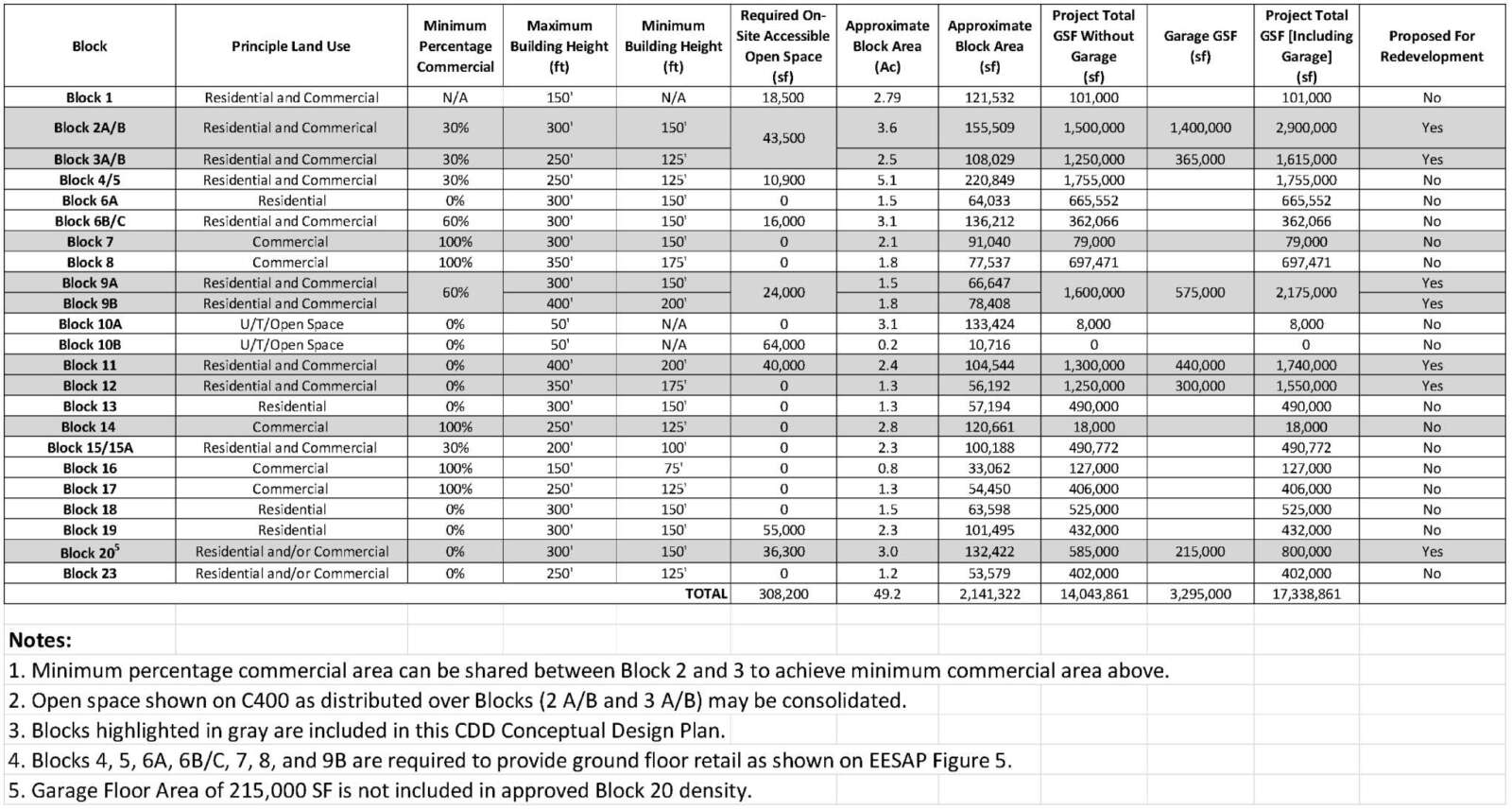
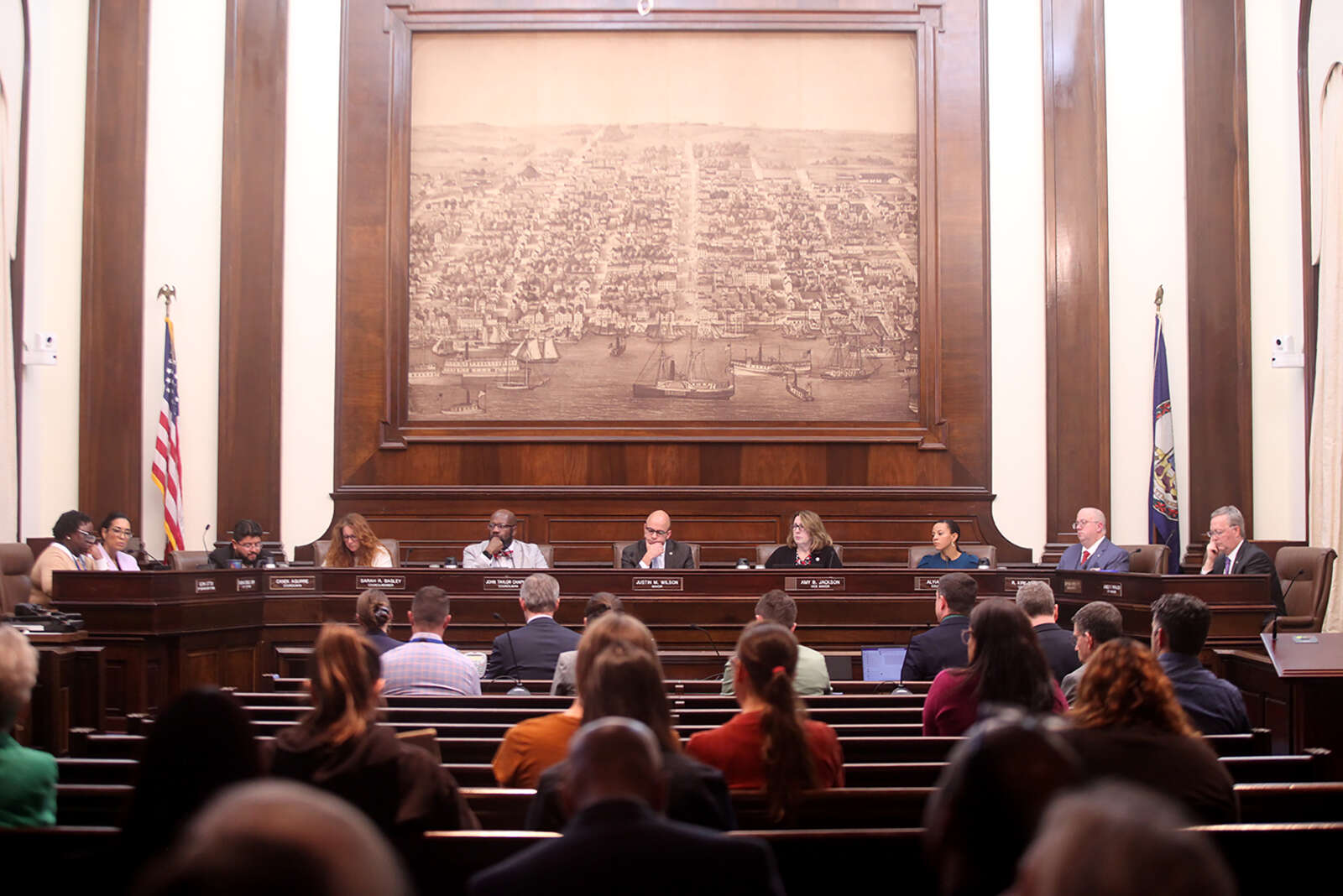
A new advocacy group called the Communities for Accountable City Council (CACC) is pushing for Alexandria to return to a wards/district system for City Council elections.
Currently, all members of Alexandria’s City Council are elected at-large. A ward or district system would, like the School Board, have City Council members elected from and represent certain neighborhoods.
CACC leader Tom Kopko said he formed the group after City Council voted to end single-family-only zoning last year. Kopko said his hope is a ward system would make city leaders more accountable to the residents of the city’s neighborhoods.
“We’re a group of people who are totally frustrated with the obvious intransigence and lack of accountability of City Council,” Kopko said. “There’s a long list of grievances, the latest is Zoning for Housing. They betrayed homeowners and, against massive opposition, passed [Zoning for Housing] unanimously.”
Kopko said the at-large system makes it harder to get city leadership to focus on neighborhood-specific issues.
“Citizens have no recourse against seven elected officials and staff, all because they’re elected at large,” Kopko said. “Who is the person who cares about your neighborhood?”
The current City Council expressed unanimous opposition to the idea of wards last year, with some saying it would create more infighting as City Council members worked to secure funding for their neighborhoods at the cost of others and to city-wide programs.
“I would not be supportive of returning to wards,” said City Council member Kirk McPike. “Wards tend to foster competition and division between parts of our city. A lot of challenges we face need to be a whole city effort to address them, not one part or another bearing more of the weight. Under the current system, we can take a broad view on issues such as some of the flooding issues that affect a small geographic area but are incredibly expensive to address.”
Mayor Justin Wilson said wards could backfire on those hoping for better neighborhood representation given that representatives of one neighborhood could still easily be outvoted by the rest of the Council, which would have no incentive to cater to the needs of a neighborhood outside of their ward.
“If anything, it could make the Council less likely to incorporate the concerns of localized opposition,” Wilson said.

The Alexandria Police Department is asking City Council to fund an incentive program to help it monitor crime in real-time.
Council will consider the release of $20,000 to help create the Alexandria Real-Time Information Center (ARTIC) at its meeting on April 24.
City staff said in a memo that ARTIC will establish a “doorbell camera registry, phased implementation of security cameras (license plate readers) and future integration with privately owned security camera systems.”
The city has experienced a crime surge the last several years. APD said that the main goal of the program is to monitor and analyze data in real-time and enhance public safety.
City Council placed the funds in a reserve account during last year’s budget process. The initial plan was to encourage homeowners and business owners to be incentivized to buy private security cameras, but the City Attorney found a number of “legal hurdles” to creating such a program.
Last year, Council also approved $490,000 for five speed cameras at school crossing zones around the city, adding to the speed camera program in multiple school zones.
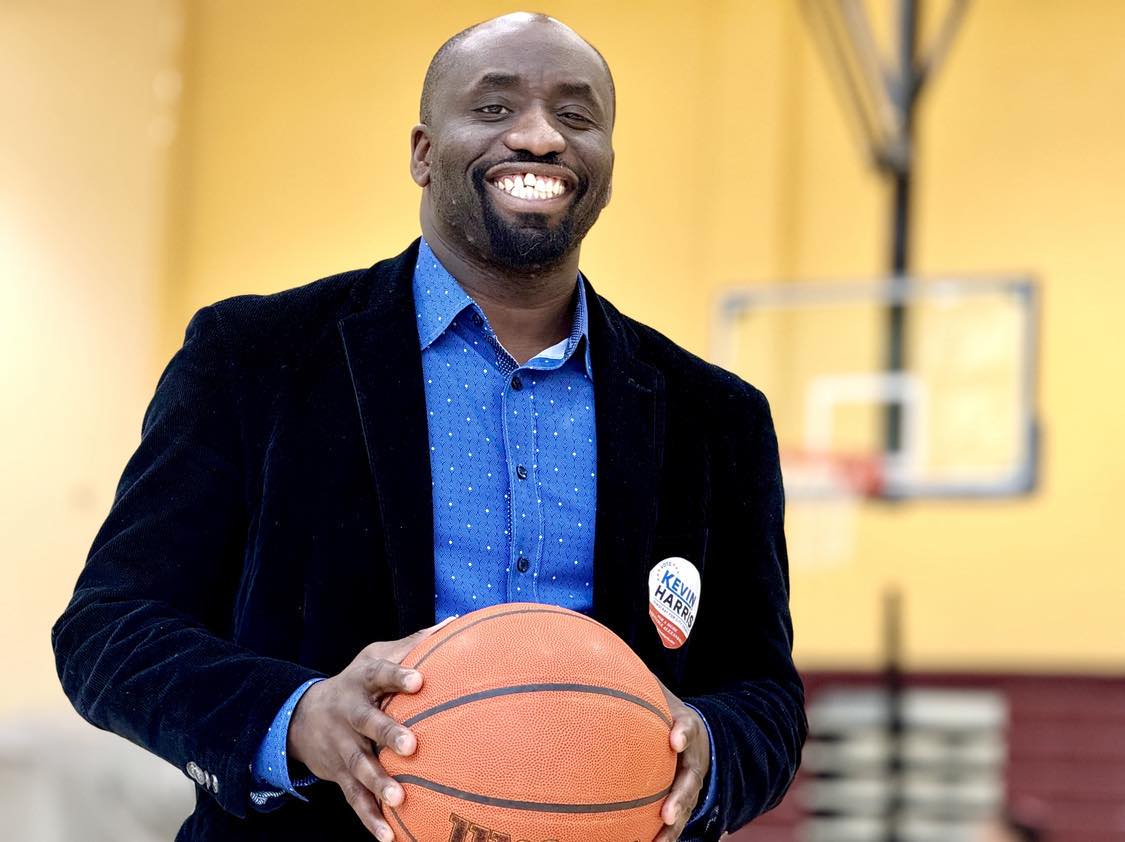
Kevin Harris didn’t like the way the 2021 City Council primary went down and now he’s taking another shot.
Harris was edged out by just 750 votes, with Council Member Kirk McPike taking the sixth and last available Council spot. Now he faces 11 opponents in the upcoming June primary.
“This truly is a family affair for us,” Harris said. “Obviously some tears were flowing from my wife and children… It’s a commitment to be up here, and it’s a privilege to have been working on all the things I’ve been doing in the city of Alexandria.”
Harris has been president of the Alexandria Redevelopment and Housing Authority (ARHA) Resident Association for more than a decade. He’s a lifelong city resident and lives in Old Town with his wife and four children in an ARHA property near to where a rash of shooting incidents have occurred.
ARHA and the police erected video cameras in the area and patrols have increased over the years. Harris says that when the city hires a new police chief that community policing and officers on foot patrols need to be brought back to the area.
“I’m talking about community policing in terms of having a real relationship, real connection with your residents,” Harris said. “Where people can identify the officers, they know their names, they don’t feel threatened when they see an officer coming towards them.”
Harris got his Bachelor’s Degree in business from Alabama State University, where he got a full athletic scholarship and was named captain of the basketball team. He later played professionally for the Dakota Wizards. In 2003, he founded Hoop Life Inc. and has since taught basketball camps, clinics, classes and after-school programs throughout the region. He’s also an ordained Minister at the Love of Christ Church in Del Ray, where he teaches Sunday school.
On the failed Potomac Yard arena deal, Harris said that it’s better that the Washington Wizards and Capitals are staying in D.C.
“Aside from the huge fact that the deal could have caused displacement for marginalized communities, partially sidelined labor unions, and created a complex traffic situation, it was clear from my talks with community members from various sects of the city that the vast majority of Alexandrians didn’t want it or were indifferent towards it,” Harris said. “Regardless, this situation has sparked a unique opportunity for our city to continue in dialogue on the real issue, how to boost our commercial tax base.”
Harris has gotten endorsements from NOVA Labor, former City Council Member Willie Bailey, as well as the ARHA Resident Association and other labor groups.
Harris said that outgoing Mayor Justin Wilson will be missed, and needs to be replaced with “someone who listens.”
“Before you get into the technicalities of what it takes to run a city, you got to first really care,” Harris said.
Harris would like to see a free trolley, like the King Street Trolley, drop visitors at the city’s historic spots. He also said that the city should look for creative solutions before deciding on a tax increase and needs to favor a more welcoming small business environment.
“I always say that a budget is a moral document,” he said. “That’s my key thing, and understanding that our children are really important. But running the city is not not too much different than running a household. A lot of times you know, you have to make sacrifices.”
Harris also grew up homeless, living with his single mom at the homes of family friends. Consequently, he says that he’s been a lifelong advocate for affordable housing.
“Basketball has been a tool that has taught me so much in my life,” Harris told ALXnow. “You have to learn how to deal with adverse situations and push through them by using your fundamentals you’ve learned so hard to master. Basketball allows you a better understanding of who you are, and how to leverage your strengths and weaknesses.”
Harris said that Michael Jordan was his idol growing up.
“It was his mindset,” Harris said of Jordan. “He was determined to win, to be competitive and understood what was needed to win.”
The Democratic primary is on June 18.
After years of planning, a new neighborhood was just approved to replace the former Vulcan Materials site in Alexandria’s West End.
City Council approved the proposal 5-1 at their Saturday public hearing, with City Council Member Canek Aguirre voting in opposition.
Lennar Corporation and Potomac Land Group II LLC can now build a dual-branded 11-story hotel with 256 rooms facing S. Van Dorn Street on at 701 S. Van Dorn Street and 698 Burnside Place, as well as condominiums, townhouses and a new public park. Renderings of the hotel revealed a Hilton Garden Inn and Homewood Suites.
The group also plans to contribute $3.5 million into the city’s Affordable Housing Trust Fund instead of including affordable housing on the 18-acre site. Additionally, $2.6 million would go toward construction of the 4.4-acre Backlick Run Park in the northwest corner of the property, and the developers would also build a pedestrian bridge from the property to the park.
Aguirre said that the project is an island without affordable housing, and said that the plan does not create a new voting precinct, or a school, and is difficult for the community to otherwise access.
“This is acres and acres of land,” Aguirre said. “We don’t get an opportunity to deal with this much land like this, and to say that we’re gonna have this large of a site and not have anything affordable, I don’t know how we do that.”
The site is the former home to a gravel and granite processing site, and is approximately a half-mile from the Van Dorn Metro station. About one-third of the property can’t be developed due to its previous industrial use.
Mayor Justin Wilson said that the city can’t always get what it wants, especially with such an industrial parcel of land.
“We want to do it all,” Wilson said. “We want public art, we want open space, we want affordable housing. We want it all and the reality is that it all does not pencil out.”
Ken Wire represents the developers and told Council that it will take a year to do environmental cleanup on the property and three years before housing units can be sold.
The plan also calls for construction of 204 condominiums, 88 back-to-back multifamily units, and 31 townhomes connected on an internal street network. Wire said that the condos would range in price from $400,000 to $600,000.

A new advocacy group has formed in hopes of returning Alexandria to a district/wards election system.
The Communities for Accountable City Council (CACC) describes itself as a non-partisan group of Alexandria residents “exasperated with the intransigent Alexandria City Council that is unaccountable to communities and neighborhoods because of Alexandria’s At-Large election system.”
While the group is non-partisan, leader Tom Kopko said the origins of the group are in the contentious decision last year to end single-family-only zoning as part of a new plan called Zoning for Housing.
“We’re a group of people who are totally frustrated with the obvious intransigence and lack of accountability of City Council,” Kopko said. “There’s a long list of grievances, the latest is Zoning for Housing. They betrayed homeowners and, against massive opposition, passed [Zoning for Housing] unanimously.”
Zoning for Housing faced opposition from local homeowners, but also garnered support from others who say greater density is the only path to building enough housing to make Alexandria affordable.
Kopko said the feeling among residents he’s spoken to is that the City Council is unaccountable because they’re elected at large.
“Citizens have no recourse against seven elected officials and staff, all because they’re elected at large,” Kopko said. “Who is the person who cares about your neighborhood?”
Kopko pointed to a federal judge’s ruling that Virginia Beach’s at-large voting system is illegal as an example of at-large voting being struck down elsewhere in the state.
“Rejection of district elections is a rejection of every other electoral system that we all know and expect,” Kopko said. “The smaller the district, the more responsive the elected representative. That principle applies to anybody, no matter where they live.”
While Kopko said the group was formed in response to opposition to Zoning for Housing, Kopko said he believes the change could also benefit those who live in apartments or supported Zoning for Housing.
Regardless of where people are on Zoning for Housing: nobody had a representative for their community. Everyone had to try and lobby seven different people. That is totally unfair. The Zoning for Housing decision didn’t allow, for example, Del Ray — which was completely betrayed by Zoning for Housing — to hold any particular person accountable. Now they have to try and hold seven people accountable? That’s not the American way, no matter what their community of interest is.
A change to the district or ward system would require changing the city charter, Kopko said.
CACC said the district/ward system is a relic of segregation:
For its first 150 years, Alexandrians elected their city government by district/ward, until 1950 when segregationists installed at-large elections to suppress minority voices. Today, at-large elections similarly insulate the centrally-elected City Council from all voices, even betraying their core supporters.
This is far from the first time wards have been discussed for Alexandria’s City Council. A Washington Post article in 1992 highlighted similar back-and-forth arguments over wards. Reporter and historian Michael Lee Pope wrote that there was a similar battle between Del Ray and Old Town in 1932.
Last year, all current City Council members expressed unanimous opposition to a ward system in Alexandria.
Mayor Justin Wilson said he has mixed feelings on wards; saying that while he isn’t opposed to them in general, he doesn’t think they’d solve problems in Alexandria.
“I’m not categorically opposed to wards, but I generally don’t think they would solve the issues those who advocate for them believe they would,” Wilson said.
Wilson said most advocates for wards are either opposed to a specific land-use decision and believe the result would be different with specific neighborhood representation — as is the case with CACC — or are Republicans and other political groups who believe they could get more representation if the city had wards — as was the case in 1992.
But Wilson said having one member out of seven opposing a project with a citywide benefit won’t derail a project.
“If anything, it could make the Council less likely to incorporate the concerns of localized opposition,” Wilson said.
For those Republicans hoping to get a seat on Council via wards, Wilson said there’s further bad news.
“There is really no way you could draw wards in Alexandria to result in ‘Republican’ districts,” Wilson said. “Our lowest Democratic-performance precincts are still 50+%.”
Still, Kopko said the current at-large system is a relic of a bygone era that needs removal.
Pope wrote that advocates of the at-large system argued the removal of “sectorial interests” would create better candidates to lead the city. Meanwhile, opponents of the at-large system argue, as Kopko does, that the at-large system allows the City Council to overlook the interests of parts of the city without facing consequences.
Alexandria Living Magazine reported that the vote for an at-large system in 1950 intentionally limited minority voices.
“The origins of the at-large system are quite ugly, from the segregationist period — from the TC Williams era,” Kopko said. “I don’t know how anyone reading the history of a large system being based on a segregationist system could be in favor of it. How could you?”

